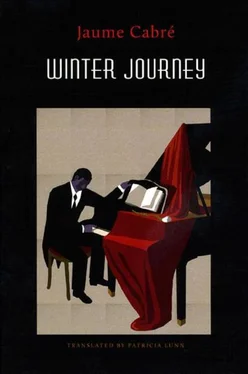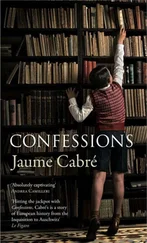"You've always gotten through things. Always!" Begging, "Isn't that guarantee enough?"
"1 make music to be happy. Playing in public stopped making me happy a long time ago. And today…"
"Who says music is supposed to make you happy?" Pardo interrupted him, enraged. "It doesn't make me happy either, and 1 put up with it."
Bros looked at his face: Pardo wasn't being funny. He watched his agent, who hated champagne, pour himself a glass and he understood why he was doing it.
"Don't worry, I'm not trying to get drunk. I'm making this decision with a clear head."
Pardo realized that this crisis was different from the others and decided not to use the curses and insults he had on hand. He pretended to take a sip of champagne and put down the glass. Since Bros was just looking at him in silence, he began to enumerate: First, you don't know how to do anything else than perform.
"I can rest. 1 can give lessons."
"Second, you don't have any fucking idea how to give lessons. You've never earned your living by giving lessons; you've never had enough patience to give lessons."
While Pardo was going on to number three, Bros thought that that wasn't true, for a few weeks he'd given lessons to his neighbor, a very sweet girl, very… 1 don't know, very.
"Are you sure it doesn't bother you when 1 practice?"
"No! We like it. When you…, my mother and 1… we even stop talking, so we can hear better. And we love to talk." In a lower voice, "What 1 don't like is when you're away."
"But then it's quiet. This time I'm going to be gone for a couple of weeks."
"Don't go."
"What?"
"No, 1…"
The girl looked right at him, with her bright amber eyes, beautiful, and wondered why he wasn't even aware she existed, a man so… so…
"Don't worry. When 1 get back we'll do some extra classes."
"No, that's not what 1 meant. It's…"
"You have talent. But you should look for a better teacher. Somebody organized, who knows how to give lessons. I'm very…"
"1 want to be… study with you. Only you. Always."
His only student. One day when he was feeling very weak and very alone he told her how he suffered before every concert. And she, with those eyes, understood him in silence and didn't dare to take his hand. They were strange, those lessons, irregular but intense sessions that went on for almost three years. They ended when he changed apartments and stopped thinking about the girl and the lessons. Until today. What was her name?
Then the bell rang and Pardo stood up, very tense, having gotten to number five, which had to do with professional responsibility and our long friendship and you can't do this without jeopardizing the whole thing and if you'd gotten married you'd be a lot more stable. He gave up on the speech and said in a neutral tone:
"The first bell. You should…"
Pere Bros made a gesture that could have meant anything. Pardo decided that maybe it meant Fine, l give up, l agree. So Bros wouldn't feel pressured, he left him alone in the dressing room.
Pere Bros knew the number of the Musikwissenschaftzentrum by heart from the many, many times he'd opened his address book, spent a few minutes thinking, 1 don't have any right to interfere, but now that he's lost Anna, L., and the many times he'd dialled the number and hung up before the secretary answered and said, What can 1 do for you, Herr Bros.
"I want to talk with Herr Wesselenyi. It's urgent."
He wasn't there and she was very sorry. But because it was urgent, she gave him the number of his cell phone and Pere found him somewhere in Vienna, sounding a little distracted: Hey; Peter, what do you want, and he said, No, nothing, just thanks for the book about Fischer. I've only been able to flip through it, but you can tell it's amazing. And he stopped talking to let Wesselenyi express some interest. But he did nothing more than ask the conventional question.
"1 can't play," Pere Bros confessed, finally. "And 1 can't not play." After an uncomfortable silence, "1 think about you a lot. I'm sad, Zoltan."
it made him feel very bad that Wessenlenyi kept his distance and he thought, Why are you always so cold, Zoltan. To get a reaction from him, he said, "1 haven't slept in six months because I'm so upset and 1 need some rest. And you told me…"
Zoltan's answer disarmed him: he asked if they could talk some other time, which made Pere desperate because his friend didn't realize it was now or never. He tried to make him react. "You told me, if music keeps you from being happy, quit music."
"Listen, we'll talk about this, all right?"
Pere searched desperately for a gambit that would keep the conversation going. He found it. "I've seen Schubert."
"Schubert?"
The hesitation that Pere noticed was too long. So long that he felt humiliated and had to say something.
"Fine, fine," he said in a cutting tone, perhaps of surrender.
"Call me some other time, all right?"
"1 love you, Zoltan. With all my heart. Remember that."
He hung up so as not to feel the disappointment of the cold response, and thought, Life is a bitch. The man 1 love is always a thousand miles from my hotel and my desire and he doesn't even know how l long for him. He finished the glass of champagne and waited for the second bell, seemingly resigned.
When the second bell rang, Pardo was saying good-bye to Madame Grossman. When he was free, he went back to the dressing room prepared to drag Bros out if he had to. The room was empty, as if Bros had decided to run away. Pardo felt scared and was seized by a premonition as strong as a battery of heart attacks, which made him even more scared, and he left the dressing room ready to hunt down the pianist and kill him or else to fall on his knees in front of somebody and say he was sorry about whatever they said he should be sorry about. When the third bell rang, he heard applause in the hall. That was odd. He went to the door and opened it a little, to the disapproval of the stage manager, and looked out. People were still rushing in, wondering what the hurry was. Pere Bros was already there, bowing with his eyes shut. Pardo, calmer now, thought that maybe he needed a vacation. And with things moving and one more crisis behind him, he went into a corner with his cell phone because he had to finalize the date for Bros, that nut, to play a recital at the Vatican.
What's going on? thought Amber Eyes. B-flat, A, D-flat, B, C. That's not Schubert. Two seconds later, when the sarabande began, there was a rustle in the hall, accompanied by 1 told you he was crazy, completely nuts; and an offended If I'd known this was going to be modern 1 wouldn't have come, this is a trick; and Do you recognize this, because in the program it says… Hey, I'm here to listen to the three Schubert sonatas from 1828! In the back balcony, Amber Eyes was afraid because the angry man who was saying that Bros was crazy was probably right. Crazy from so much pressure, that only she knew about, her sweet secret, if only she could help him. Whistling broke out on one side of the front balcony, but the polite contingent of the audience managed to silence the protest. Bros was on the second variation, with Wessenlenyi's book open like a score. Then Pardo, who was on the phone ruling out dates and times with Monsignor Walzer, a shadowy and obscure Vatican bishop, became aware of the music he'd been listening to for some time, and his heart lurched because what that son of a bitch Bros was playing wasn't Schubert by any stretch of the imagination. His swearing scandalized his Vatican interlocutor, who was simply trying to make sure he had a pianist for a private recital in the Santa Clara salon. Yes, you can count on that, Monsignor.
The first variation: he'd never heard anything like it, ever. It's not a harmonic development of the theme; it's certainly not a main melody that modulates towards distant tonalities. It's… Mein Gott, I would never have thought anyone could make music like this. The harmonic patterns of the melodic theme and the melodic patterns of the harmony are woven together. How strange. There's no tonic, no relationship between major and minor, just music floating in the air. Mein Gott. What ugly and strange perfection. But… and my sonatas? Why doesn't he play the first sonata from 1828?
Читать дальше












